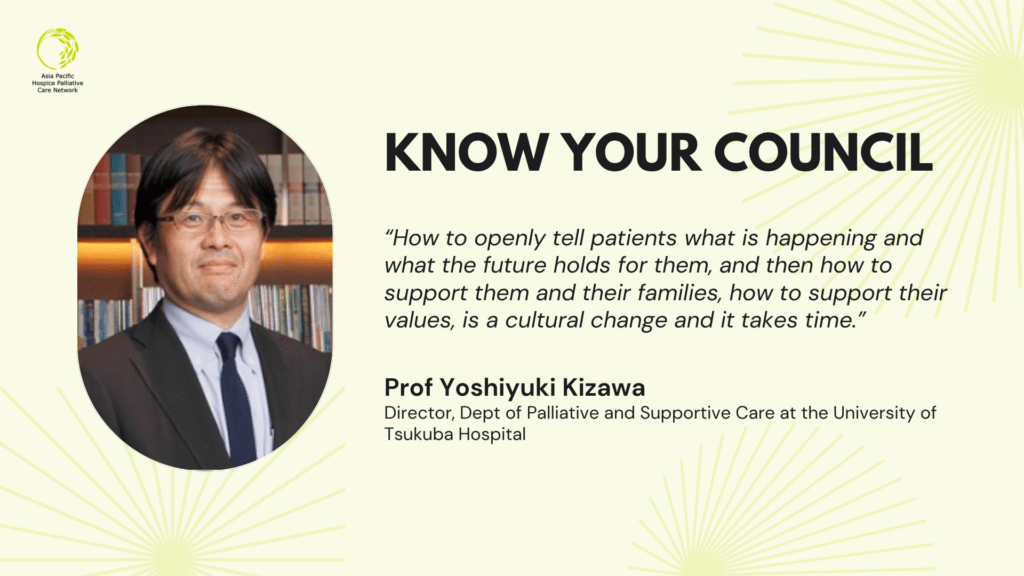
About
Yoshi (Yoshiyuki Kizawa) is a Director of the Department of Palliative and Supportive Care at the University of Tsukuba Hospital and the Professor of Palliative Medicine at the University of Tsukuba, Institute of Medicine. He has been recently re-elected as President of the Japanese Society for palliative medicine in Japan, which has more than 12000 members. He has been a council Member of APHN and serves as the Research Committee Chair.
Yoshi leads the education program that aims to acquire basic skills of palliative care for all health care professionals to improve the quality of life of patients and families who are in life-threatening conditions. The national primary palliative care education project namely PEACE (Palliative care Emphasis program on symptom management and Assessment for Continuous medical Education) was launched in 2007 funded by the Japanese government and disseminated all over Japan. Until March 2022, more than 150,000 physicians finished the 2-day education course. This educational project very much contributes improving the integration of palliative care in oncology in our country.
He also has a strong interest in teaching and practicing advance care planning. Yoshi leads a National Advance Care Planning Education Project, funded by the Japanese government, namely E-FIELD ( Education for Implementing End-of-life Discussion).
As the Chair of the Research Committee, could you share some insights into the current and upcoming research initiatives within the Asia Pacific Hospice Palliative Care Network? What are the key areas of focus, and how do you see these research efforts impacting the field of palliative care in the region?
The Research Committee has four objectives,
1) To improve the quality of palliative care in the Asia-Pacific region through research; 2) To promote research in palliative care
3) To train palliative care researchers (especially young researchers)
4) To promote international exchange through palliative care research.
Activities in the current term include conducting an international comparative study on Advance care planning and organising the Asia-Pacific Palliative Care Research Forum in Incheon in October 2023. In total, more than 40 people attended the Forum and learned a lot and made many friends. We hope that the Forum will be a springboard for new research projects.
Your work on the PEACE program, which has trained a significant number of physicians in palliative care, has been instrumental in Japan. Could you describe the program’s evolution and its impact on the integration of palliative care in oncology?
In the Cancer Control Act enacted in 2007 and the Basic Plan for the Promotion of Cancer Control based on it, it became national policy to ensure that all cancer patients have access to palliative care. We therefore decided, as an important part of the policy, that all cancer doctors should be trained in basic palliative care, and PEACE (Palliative care Emphasis program on symptom management and Assessment for Continuous medical Education ), a primary palliative care education program, was created, led by experts in palliative care, of which there were still very few at that time. The program had two key components: symptom relief, including pain, and communication, and was initially designed as a two-day course. The Government also made it mandatory for oncologists in all government-designated cancer centres to attend this training course. Around 10,000 people attend the course annually, with more than 150,000 having completed it by 2023. As a result of this education project, for cancer patients, all those in need now have access to basic palliative care.
The field of palliative care is evolving rapidly. Can you share your thoughts on the most significant advancements or changes you’ve witnessed in palliative care during your career, and how these developments are impacting the way care is provided in the Asia Pacific region?
I see two major changes: first, the use of opioids for cancer pain has become the norm, and second, patients are being told the truth, even if it is bad news. These two started in Japan in the early 1990s. The situation has rapidly improved with regard to opioids, but there is still a way to go with regard to communication. Because until then, in Japan, we had not told patients the bad news. How to openly tell patients what is happening and what the future holds for them, and then how to support them and their families, how to support their values, is a cultural change and it takes time. We recognise that this is a common challenge in Asia.
In your role as a palliative care leader, what’s a particularly heartwarming or memorable patient or family experience that you’ve had?
It is the loss of my father and mother in the last five years – a story I told at the APHC, but it is a long story, so let me skip it.
When you’re not busy with your professional commitments, how do you like to unwind or take care of yourself? Do you have any hobbies or activities that help you relax and recharge?
I enjoy cooking and DIY. Making lunch and dinner every day is a wonderful break.
If you were to give aspiring professionals in palliative care one piece of advice, what would it be, and why? What valuable lessons have you learned in your career that you’d like to pass on to the next generation of caregivers and researchers?
As a palliative care clinician, there are three very simple but important principles.
The first is to never leave patients alone and always think about them together; the second is to always remember to reflect and try to make a small improvement every day; and the third is to make friends who you can work hard with and cherish the relationships you have with them.
